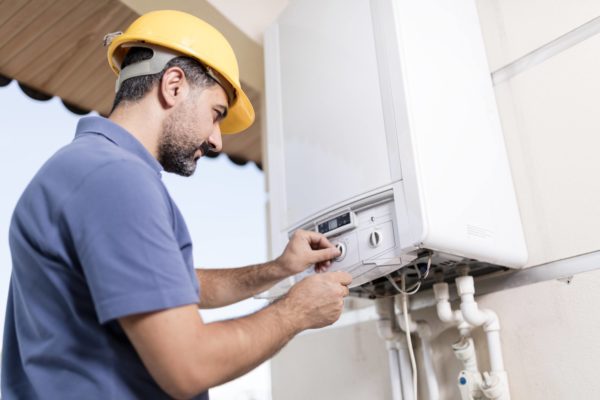In the event that a boiler is installed in your home, there’s a good chance that you’ve never thought about the pressure your boiler has before now. However, these systems commonly have problems with pressure, which is why you should know what these issues can be and what they mean for the condition of your system. Being able to detect these problems means that you can have them repaired before they worsen.
The majority of modern boilers only require maintenance service on an annual basis. However, you’ll still want to look at the pressure gauge on the system every now and then. This gauge shows you the current pressure of any water that’s circulating in the boiler. In the event that the pressure is higher than it should be, it’s more likely that leaks will develop. Low pressure might result in the system malfunctioning altogether. If you’re worried about changes in boiler pressure, call our technicians at Thermo Direct today.
How You Can Check Your Boiler Pressure
The latest boilers come with a pressure gauge that’s displayed as a round dial positioned toward the front of the boiler or below the control panel. As for older boilers, it’s more likely that the pressure gauge is positioned below the system, which is where the pipework is located. If you received an instruction manual when the boiler was first installed, you should be able to find the information you’re looking for.
What Is the Ideal Boiler Pressure?
It’s possible for boiler pressure to dip too low or rise too high when taking the entire pressure scale into account. While low boiler pressure isn’t too problematic, both of these issues can lead to your boiler not functioning correctly. Knowing how to react to pressure changes is important if you want to keep your system in optimal condition.
The instruction manual you received when you first purchased the boiler should tell you what the system’s ideal pressures are. If, however, you’ve lost this manual, the majority of boilers are similar in pressure differential. The standard cold pressure of a boiler is usually right around 12 pounds per square inch (psi).
Pressure gauges typically come with different-colored zones. In the event that the needle is positioned outside of the green zone, there could be issues with your boiler that need to be addressed. Keep in mind that the effects of low pressure differ from the effects of high pressure.
If the pressure is too low or too high in the system, it’s possible that your boiler could continue to be operational for an extended period of time. However, you should have this issue fixed before the system starts shutting down.
Standard Range of Pressure Changes
Pressure tends to change in a boiler when the system increases the heat. In this scenario, the pressure should increase to around 20 psi while the heating element is operational. Even though 20 psi is relatively high, it’s still in the normal pressure range. When pressure changes occur by several psi in one direction or another, this could be the result of atmospheric or environmental conditions.
Most of these units are safe to operate until they reach readings of around 30 psi. If readings go higher than 30 psi, the seals could start to fail.
Exceptions to Optimal PSI Range
There are a few exceptions to the optimal psi range mentioned previously. In the event that you live in a home that has two to three stories, your boiler should run at upward of 15-18 psi.
If you find that your boiler pressure is dropping further than you would like, it’s likely that a leak has occurred.
High Pressure Problems
There are several issues that can result from high boiler pressures. When the pressure gets too high, your system could shut down automatically. Most modern boilers are outfitted with pressure release valves, which are typically tripped at around 30 psi. When these valves are tripped, excess steam will be released to ensure that the pressure drops to normal levels. The power to your boiler will also be turned off.
If your boiler happens to turn off as a result of high pressure, you should keep the unit powered down until an experienced professional like ours can inspect it. The same is true if your unit is currently in the standard pressure range but has experienced high pressures in the past.
Low Pressure Problems
There are several signs that indicate your boiler pressure may be too low, the primary of which include:
- The dial on your boiler’s pressure gauge is below the optimal range.
- You aren’t receiving any hot water or heating in your home.
- The radiators in your home aren’t heating up correctly.
The ideal pressure for a boiler is 12 psi. In most cases, the unit will refill itself until it reaches 12 psi. You can also perform this task manually, which will ensure that your boiler remains operational until our technician arrives. Keep in mind that lower pressures are typically managed by depressurizing the boiler.
It’s possible that your heating system has low pressure because of a small leak. Even if you don’t notice water escaping from the boiler, there are times when these leaks are difficult to detect. Over time, psi levels will drop too low.
Reasons for Substantial Pressure Changes
The risk of sizable pressure changes in your boiler increases if your unit is more than 10 years old. Even when a boiler is well-maintained, the components inside the unit eventually become worn-down. This issue can be mitigated by upgrading your boiler. Our NATE-certified technicians can help you identify if a new boiler install is needed.
Your boiler may also contain too much water. If you notice a leak, the heating system might have been overfilled, which causes the system’s psi to increase. The boiler pressure gauge itself could be broken or damaged. Modern boilers usually have error codes that are displayed on the control panel. These codes run when problems are detected with the pressure.
How to Increase or Decrease Boiler Pressure
While there are steps you can take to increase or decrease your boiler’s pressure on your own, it’s highly recommended that you get in touch with our technicians at Thermo Direct. We have the training and knowledge required to quickly determine why your system’s pressure is too low or too high, which makes it easier for us to safely decrease or increase boiler pressure.
Our services at Thermo Direct are meant to account for all of your heating, cooling, electrical, and air quality needs. If your HVAC unit or boiler needs to be repaired, our technicians can diagnose the problem and provide you with a fair estimate. Full installation and maintenance services are also available. The electrical services we provide include everything from electrical repair and installation to whole-home surge protection. If you want to be certain that your home’s air quality is high, we offer extensive air quality services that include weatherization and crawl space sealing. Call Thermo Direct today to schedule an appointment or find out more about the services we provide to Raleigh, NC and the surrounding communities.









